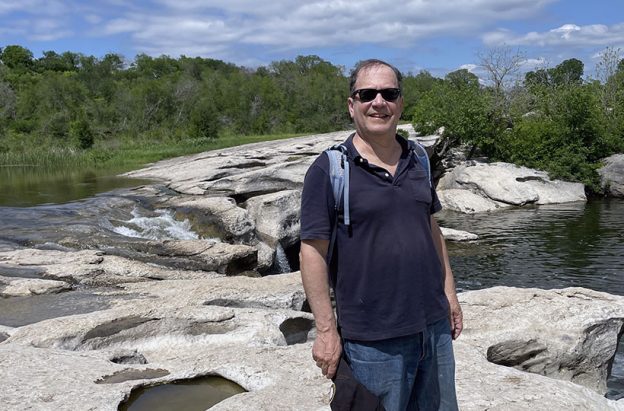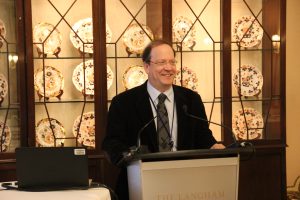
Five questions for … Dr. Michael Kanter
Dr. Michael Kanter is an associate investigator with the Department of Research & Evaluation and the chair of Clinical Science and a professor for the Kaiser Permanente Bernard J. Tyson School of Medicine. He has been a quality care leader for Kaiser Permanente at both the regional and national levels for many years and was responsible for the development of the organization’s national quality strategy. He designed and implemented a model of care for chronic disease and prevention called Complete Care. He also designed and implemented Kaiser Permanente Sure Net, a program to decrease missed or delayed diagnoses and increase medical safety. He won the Avedis Donabedian Healthcare Quality Award from the American Public Health Association for his “exemplary leadership in reducing diagnostic errors.” Dr. Kanter has authored more than 110 articles published in peer-reviewed journals.
Tell us about your start here at Kaiser Permanente.
I was 28 years old and fresh out of my residency in 1984 when I was hired as a pathologist in the West Los Angeles Medical Center. I thought Kaiser Permanente would be an interesting place to work for a while. I never dreamed I would stay for 40 years.
When did you become involved in research?
I started research with a project looking at hemolytic disease of the newborn. That is a blood disorder that occurs when the blood types of a mother and baby are incompatible. At the time, in the late 1980s, some patients wanted direct blood donations from people they knew due to a fear of AIDS. But there was a question about whose blood would be safest for the baby. It was known that the risk of hemolytic disease of the newborn would be higher if the father of the baby was the blood donor, but our study showed that there was also an elevated risk if the father’s relatives also donated. This finding was quickly incorporated into policy standards by the American Association of Blood Banks. The study was published in Transfusion in 1989.
I continued publishing other research related to transfusion medicine over the next decade or so and in 1994 I was asked to open a blood donor center at the Woodland Hills Medical Center. It’s a nice story about how research can move one’s career!
In 2004, I became regional medical director of Quality and Clinical Analysis. Part of that job was overseeing the Department of Research & Evaluation.
What was the state of research within Kaiser Permanente at that time?
Historically, in the early days in Southern California, there was not a large focus on creating a large research infrastructure. The feeling was that research was not necessarily in the mission of Kaiser Permanente and it was correctly noted that money spent on research was money not spent on direct patient care. Kaiser Permanente Northern California, on the other hand, had a very large research unit going back a very long time. We were able to turn that opinion around.
You hired Dr. Steven Jacobsen with the intent of growing the department. Why was that important?
It was an interesting time and at one point, we were down to 3 or 4 scientists. So, we really needed an experienced researcher to come in and build it back up and that’s when Steve Jacobsen was hired in 2006.
It was a plus that he came from Mayo Clinic because it had some similarities to us in that they had data going back for many years. Steve and I also shared an interest in how that data may impact the practice base. We never had a vision to just do basic science. Our mission was to learn from our own patients, and from that learn how we could improve their care.
Steve started with the order to grow the department, but at the time, we weren’t quite sure how big. And we didn’t have a large budget. So, we needed investigators who could bring in grants. Every dollar we spent on research was a dollar not coming from operations.
While there was still some tension over funding and we couldn’t grow infinitely large, we knew that research would add value to our care delivery.
How has the focus on growing of the department impacted Kaiser Permanente?
The research we have conducted has taught us a lot about care. There are 2 aspects to that. There’s the external aspect where we used mostly grant funding to learn generalizable information that fits within the Kaiser Permanente mission to improve the health of our surrounding communities. This work enhanced the prestige of the organization, and everyone benefitted.
The other research, often funded internally, helped us answer clinical questions that we wanted and needed to know. It helped us guide the care in many situations, both big and small. People equate that work with the high quality of care we provide. It also helps with marketing and with showing our value to people who sell our insurance products.
What is your research focus now?
Through my appointment in Research & Evaluation as an associate investigator, I am continuing to do work with the goal of reducing diagnostic errors. Specific projects have focused on ectopic pregnancies and hyperlipidemia. At the School of Medicine, I’m working with students on research. It is important for medical students to learn how to come up with a research question, and answer that question, as well as to critically read research literature and research data.
When you aren’t busy working, what do you enjoy doing in your spare time?
I like hiking and do a lot of that in the local hills in the Los Angeles area. I also enjoy many aspects of music; I go to concerts, listen to recordings, and play piano. I’m starting to travel more and just returned recently from Kauai.
Images: Dr. Kanter hiking at McKinney Falls State Park in Austin, Texas, to watch the April 2024 eclipse. Second photo is Dr. Kanter speaking at a 2018 palliative care conference in The Langham in Pasadena, Calif.





